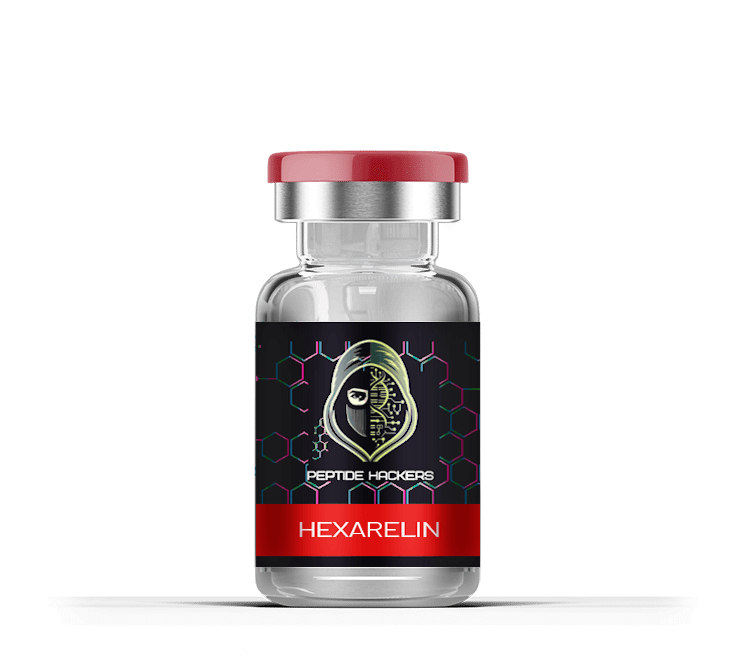DSIP Peptide: A Simple Guide to Better Sleep and Stress Relief
Shipping: We offer reliable shipping options both domestically and internationally. All orders are processed within 1-2 business days. Shipping times vary depending on your location, and you will receive a tracking number once your order has shipped. Please note that international customers are responsible for ensuring that peptide products comply with their country’s import regulations.
Returns: Due to the specialized nature of our products, we do not accept returns or exchanges. If you receive a damaged or incorrect item, please contact our customer support team within 7 days of delivery. We will work to resolve the issue as quickly as possible, either by sending a replacement or providing a refund if applicable. For additional questions about shipping or returns, please reach out to our support team.

Buy It With
Hexarelin: Growth Hormone Release Pathways in Laboratory Studies
$34.95 USD
$40.00 USD
CRITICAL RESEARCH DISCLAIMER
FOR LABORATORY RESEARCH USE ONLY. NOT FOR HUMAN CONSUMPTION. NOT FOR VETERINARY USE.
All information on this page is for educational and laboratory research purposes only. This content discusses published research studies and does NOT constitute medical advice or recommendations for human use. We are not licensed medical professionals.
ARA-290 is a research peptide NOT approved by the FDA for human use, treatment, or consumption.
ARA-290 Research Compound: Published Data Review
Understanding ARA-290 Research Compound
This article examines ARA-290, a research peptide studied in laboratory settings. Published research has examined this compound in experimental models studying inflammatory and pain mechanisms. ARA-290 is derived from erythropoietin (EPO) and has been studied in preclinical and clinical research populations. This is educational information only about a research compound NOT approved for human use.

FOR LABORATORY RESEARCH USE ONLY. NOT FOR HUMAN CONSUMPTION.
🔑 Published Research Summary
- ARA-290 (Cibinetide) is a research peptide studied in clinical trials
- Research examined mechanisms through the Innate Repair Receptor (IRR) in laboratory studies
- Studies documented observations in research populations with various conditions
- Research compared observations to other compounds in clinical trials
- Currently available for research purposes only - NOT FDA approved for human use
- Published research documented various cost ranges for research materials
- Clinical trials documented various timeframes for observations in study populations
All information is from published research for educational purposes. NOT FOR HUMAN USE.
Understanding ARA-290 Research Compound
What is ARA-290 Research Compound?
ARA-290, also known as Cibinetide, is a research peptide that has been studied for various mechanisms in laboratory settings. Research examines how this compound binds to the Innate Repair Receptor (IRR) in experimental models. Unlike erythropoietin, research focuses on inflammatory mechanisms and cellular processes in laboratory studies.
Research compound only. For educational purposes. NOT FOR HUMAN USE.
Published Research Context

Published research has studied ARA-290 in various contexts including inflammatory mechanisms and pain pathways in experimental models. Clinical trials examined this compound in specific research populations. This is educational information about published research, NOT medical recommendations.
Published research data only. NOT FOR HUMAN APPLICATION.
Research Mechanisms in Laboratory Studies

ARA-290 is a research compound that has been studied in laboratory settings. Research examines mechanisms in experimental models and clinical trial populations.
Published Research on Mechanisms
Laboratory research examines how ARA-290 interacts with receptor systems in experimental models. Studies document various cellular mechanisms and inflammatory pathways in research settings. This research examines immune system markers and various cellular processes in laboratory models.
Research observations documented various parameters in clinical trial populations including inflammatory markers and tissue parameters in controlled studies.
All information from published research studies. NOT FOR HUMAN USE.
Published Clinical Trial Data
Clinical trials have examined ARA-290 in various research populations. Studies documented observations in controlled research settings with specific inclusion criteria.
Research Observations
- Clinical trials documented various symptom markers in study populations
- Research examined tissue parameters in experimental models
- Studies documented inflammatory markers in research subjects
- Clinical trials observed various physiological parameters in controlled settings
Clinical trial data only. Individual results varied in studies. NOT FOR HUMAN USE.
Research Parameters
- Studies examined respiratory parameters in research populations
- Clinical trials documented cardiovascular markers in study subjects
- Research observed tissue parameters in experimental models
Published research data only. NOT medical information or treatment claims.
Research Compound Status
Research Material Information
ARA-290 remains under investigation in clinical research settings. While various compounds are used in medical practice, ARA-290 is currently available only for qualified laboratory research purposes.
Published Research Observations
Published research has documented various observations in clinical trial populations:
- Pain markers: Clinical trials documented various pain parameters in study populations
- Inflammatory markers: Research examined inflammatory parameters in experimental models
- Tissue parameters: Studies documented various tissue markers in research subjects
Research observations only. Individual results varied in studies. NOT guaranteed outcomes.
FOR LABORATORY RESEARCH ONLY. NOT FOR HUMAN CONSUMPTION.
Research Considerations
Published research discusses various lifestyle and supportive approaches studied in clinical trial populations. This is educational information from research, NOT medical advice.
All information is for educational purposes about published research. NOT FOR HUMAN USE.
Research Summary and Conclusions
ARA-290 represents a research compound that has been studied in clinical trial settings. Published research documents various observations in experimental models and study populations. While research continues, this compound remains available only for qualified laboratory research purposes.
IMPORTANT REMINDERS:
- Research compound only - NOT approved for human use
- Published data - Results from controlled research studies, not guaranteed outcomes
- NOT FDA approved - Not approved for medical use or treatment
- For research only - Available exclusively for laboratory research purposes
- NOT medical advice - This article is educational information only
FOR LABORATORY RESEARCH USE ONLY. NOT FOR HUMAN CONSUMPTION.
FINAL CRITICAL DISCLAIMER
This information is provided solely for educational and research purposes. ARA-290 is designed exclusively for laboratory research and is NOT approved for human consumption, veterinary use, or therapeutic applications.
FOR LABORATORY RESEARCH USE ONLY. NOT FOR HUMAN CONSUMPTION. NOT FOR VETERINARY USE.
All research must comply with applicable laws and regulations. Researchers must obtain proper institutional approval before conducting studies. Always ensure compliance with all applicable regulations regarding research compounds.
NOT FDA APPROVED. NOT FOR HUMAN USE. NOT FOR MEDICAL TREATMENT. FOR RESEARCH PURPOSES ONLY.
ARA-290 is a research peptide that has NOT undergone FDA approval processes and is NOT approved for human use under any circumstances. Consult qualified medical professionals for any medical conditions or health concerns.
Our Story, Our Promise
At PeptideHackers, we’re committed to advancing research by providing high-quality peptides for scientific and research purposes. We ensure the highest standards and transparency in every product, supporting your research with science-backed solutions. Welcome to PeptideHackers.
Frequently Asked Questions
-
Due to the sensitive nature of our research products, we do not accept returns or exchanges. However, if you receive a damaged or incorrect item, please contact our customer support team within 7 days of receiving your order, and we will work to resolve the issue.
-
Research peptides are short chains of amino acids designed for laboratory and scientific research purposes only. They are not intended for human or animal use.
-
Peptides should be stored in a cool, dry place. For long-term storage, refrigerate at 4°C, and for even longer preservation, freezing at -20°C is recommended.
-
Yes, we provide a Certificate of Analysis (COA) for every batch of peptides, detailing the purity and composition to ensure research quality.








